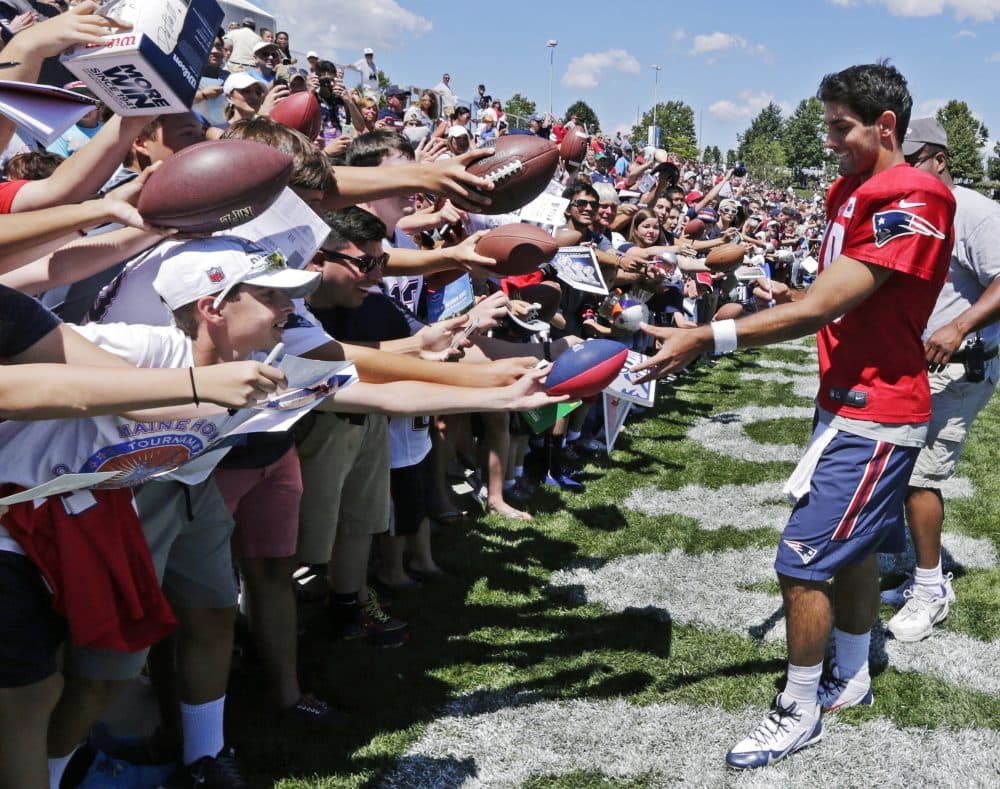Advertisement
If We Doctors Would Never Let Our Kids Play Football, Is It Moral To Watch The NFL?

COMMENTARY
My wife and I celebrate our 30th Harvard Medical School reunion this year — yes, I know, we don’t look nearly that old — and we’ve been communicating with classmates on the class listserv. (Maybe the fact that we’re using a listserv proves that we’re old. Oh, well.)
Mostly, it’s typical reunion-type stuff — family milestones, job news, classmates we’ve run into during travel — but in the last two weeks there was also some some playful banter between Falcons and Patriots fans in anticipation of this Sunday’s Super Bowl.
The topic made me realize anew that a lot has changed in the past 30 years. It’s not just that suitcases now have wheels, cameras have phones, and that doctors can order a CT scan or MRI almost as easily an Uber.
Another thing that’s changed is that football, the most popular sport in the United States, is widely believed to be “hazardous to your health.”
Take note of that phrase. Readers of a certain age (OK, my age) will remember the warnings on the packs of cigarettes from our youth, which was were ludicrously preceded by the words “may be” — as if there were any doubt even then (the 1970s) that cigarette smoking was bad for you.
The same, I’d argue, should be the view today of football, a sport so intrinsically violent and dangerous that permanent neurologic or orthopedic damage — often both — seem a common exchange for playing the game. And these grim stories, importantly, are hardly limited to professional players.
Indeed, those at highest risk for neurologic damage appear to be the players who start tackle football at the youngest age. The concerns about the safety of youth football have prompted some to propose fundamental changes in how the game is played — though clearly the rules of youth football are unchanged in much of the United States.
The data are now so overwhelming about the dangers of football that even the National Football League has acknowledged that repetitive head trauma and concussions might be linked to neurological problems — this after years of denial and obfuscation that would make the tobacco industry proud.
So with the power of that remnant of ancient tech, the listserv, at my fingertips, and the irresistible access to these smart and diverse medical minds from my class, I posed the following question to my classmates:
Would you let your child play football based on our current understanding of its risks?
In a landslide, they said no. Even those who were eagerly rooting for their team (Patriots if still here in Boston, Falcons if anywhere else) were agreeing with Barack Obama, who famously said that if he had sons, he would not let them play.
A radiologist classmate offered this anecdote:
My niece played football in high school and college — she was nose guard for the St. Louis Slam, a professional women’s full-contact football team that won the National Championship one of her years ... Football was an important part of her adolescence and young adulthood. After a while, she started to notice cognitive impairment and significant memory lapses for a few days following every game. It scared her so badly that she gave up the sport ... She is now getting an MD/PhD and would not recommend football for kids, even though it was a key component of her own youth.
Another thoughtful classmate, now a professor of medicine, wrote this:
Although I wouldn't want my own kid to play football, I admit that, perhaps disingenuously, I really enjoy watching NFL football where other people's offspring are bashing into one another ... I'm an avid TV spectator of the sport. Because of the speed, action, and thrilling plays — including contact — it is exhilarating to watch, for all its risks. Therein lies the paradox. Overall, if the nation were to outlaw pro football, I'd be disappointed as a fan but would have to agree that it's the prudent thing to do.
So if we assume football is too dangerous for our kids to play, how can we justify still being fans?
It seems to me there are two approaches to this conflict. The first is to consider watching football the equivalent of being a spectator of some other daredevil activity — BMX bike racing, cliff diving, half pipe skateboarding, the aerial pyrotechnics of Cirque du Soleil. These are certainly risky sports that some find thrilling to watch — and will continue doing so — even if we’d prefer our kids choose something else! This is clearly the choice for most of my classmates.
Less generously, we could say watching football lends support to a multibillion-dollar enterprise that destroys the lives of its players — many of them from disadvantaged, minority backgrounds — for our entertainment.
That the NFL has been notoriously bad at caring for its injured players (no guaranteed contracts, doctors who are hired by the teams and face conflicts of interest, limited post-career medical and disability coverage) should only make it more disagreeable to physicians. In this view, watching football is just a step away from watching gladiators at the Roman Coliseum or dog fights. It is sufficiently disquieting from a moral perspective that eventually we must stop doing it.
Both positions are defensible. Neither, I would argue, bodes well for the future of the game, but only time will tell.
As for my wife and me, we’ll have plenty of opportunity Sunday night to check out OpenTable for that usually tough-to-get restaurant reservation.
Readers, thoughts? Reactions?
Dr. Paul Sax is clinical director of the Division of Infectious Diseases at Brigham and Women's Hospital and a professor of medicine at Harvard Medical School.